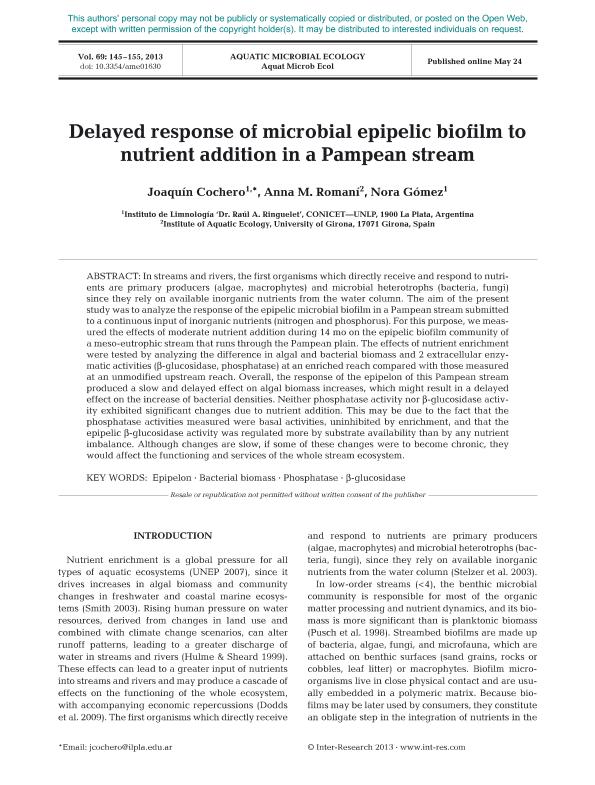Mostrar el registro sencillo del ítem
dc.contributor.author
Cochero, Joaquin

dc.contributor.author
Romaní, Anna M.

dc.contributor.author
Gomez, Nora

dc.date.available
2017-06-19T20:07:46Z
dc.date.issued
2013-05
dc.identifier.citation
Cochero, Joaquin; Romaní, Anna M.; Gomez, Nora; Delayed response of microbial epipelic biofilm to nutrient addition in a Pampean stream; Inter-Research; Aquatic Microbial Ecology; 69; 2; 5-2013; 145-155
dc.identifier.issn
0948-3055
dc.identifier.uri
http://hdl.handle.net/11336/18469
dc.description.abstract
In streams and rivers, the first organisms which directly receive and respond to nutrients are primary producers (algae, macrophytes) and microbial heterotrophs (bacteria, fungi) since they rely on available inorganic nutrients from the water column. The aim of the present study was to analyze the response of the epipelic microbial biofilm in a Pampean stream submitted to a continuous input of inorganic nutrients (nitrogen and phosphorus). For this purpose, we measured the effects of moderate nutrient addition during 14 mo on the epipelic biofilm community of a meso-eutrophic stream that runs through the Pampean plain. The effects of nutrient enrichment were tested by analyzing the difference in algal and bacterial biomass and 2 extracellular enzymatic activities (β-glucosidase, phosphatase) at an enriched reach compared with those measured at an unmodified upstream reach. Overall, the response of the epipelon of this Pampean stream produced a slow and delayed effect on algal biomass increases, which might result in a delayed effect on the increase of bacterial densities. Neither phosphatase activity nor β-glucosidase activity exhibited significant changes due to nutrient addition. This may be due to the fact that the phosphatase activities measured were basal activities, uninhibited by enrichment, and that the epipelic β-glucosidase activity was regulated more by substrate availability than by any nutrient imbalance. Although changes are slow, if some of these changes were to become chronic, they would affect the functioning and services of the whole stream ecosystem.
dc.format
application/pdf
dc.language.iso
eng
dc.publisher
Inter-Research

dc.rights
info:eu-repo/semantics/openAccess
dc.rights.uri
https://creativecommons.org/licenses/by-nc-sa/2.5/ar/
dc.subject
Epipelon
dc.subject
Bacterial Biomass
dc.subject
Phosphatase
dc.subject
Beta-Glucosidase
dc.subject.classification
Oceanografía, Hidrología, Recursos Hídricos

dc.subject.classification
Ciencias de la Tierra y relacionadas con el Medio Ambiente

dc.subject.classification
CIENCIAS NATURALES Y EXACTAS

dc.title
Delayed response of microbial epipelic biofilm to nutrient addition in a Pampean stream
dc.type
info:eu-repo/semantics/article
dc.type
info:ar-repo/semantics/artículo
dc.type
info:eu-repo/semantics/publishedVersion
dc.date.updated
2017-06-08T19:48:54Z
dc.journal.volume
69
dc.journal.number
2
dc.journal.pagination
145-155
dc.journal.pais
Alemania

dc.journal.ciudad
Oldendorf
dc.description.fil
Fil: Cochero, Joaquin. Consejo Nacional de Investigaciones Científicas y Técnicas. Centro Científico Tecnológico Conicet - La Plata. Instituto de Limnología "Dr. Raul A. Ringuelet". Universidad Nacional de La Plata. Facultad de Ciencias Naturales y Museo. Instituto de Limnología; Argentina
dc.description.fil
Fil: Romaní, Anna M.. Universidad de Girona; España
dc.description.fil
Fil: Gomez, Nora. Consejo Nacional de Investigaciones Científicas y Técnicas. Centro Científico Tecnológico Conicet - La Plata. Instituto de Limnología "Dr. Raul A. Ringuelet". Universidad Nacional de La Plata. Facultad de Ciencias Naturales y Museo. Instituto de Limnología; Argentina
dc.journal.title
Aquatic Microbial Ecology

dc.relation.alternativeid
info:eu-repo/semantics/altIdentifier/url/http://www.int-res.com/abstracts/ame/v69/n2/p145-155/
dc.relation.alternativeid
info:eu-repo/semantics/altIdentifier/doi/http://dx.doi.org/10.3354/ame01630
Archivos asociados
